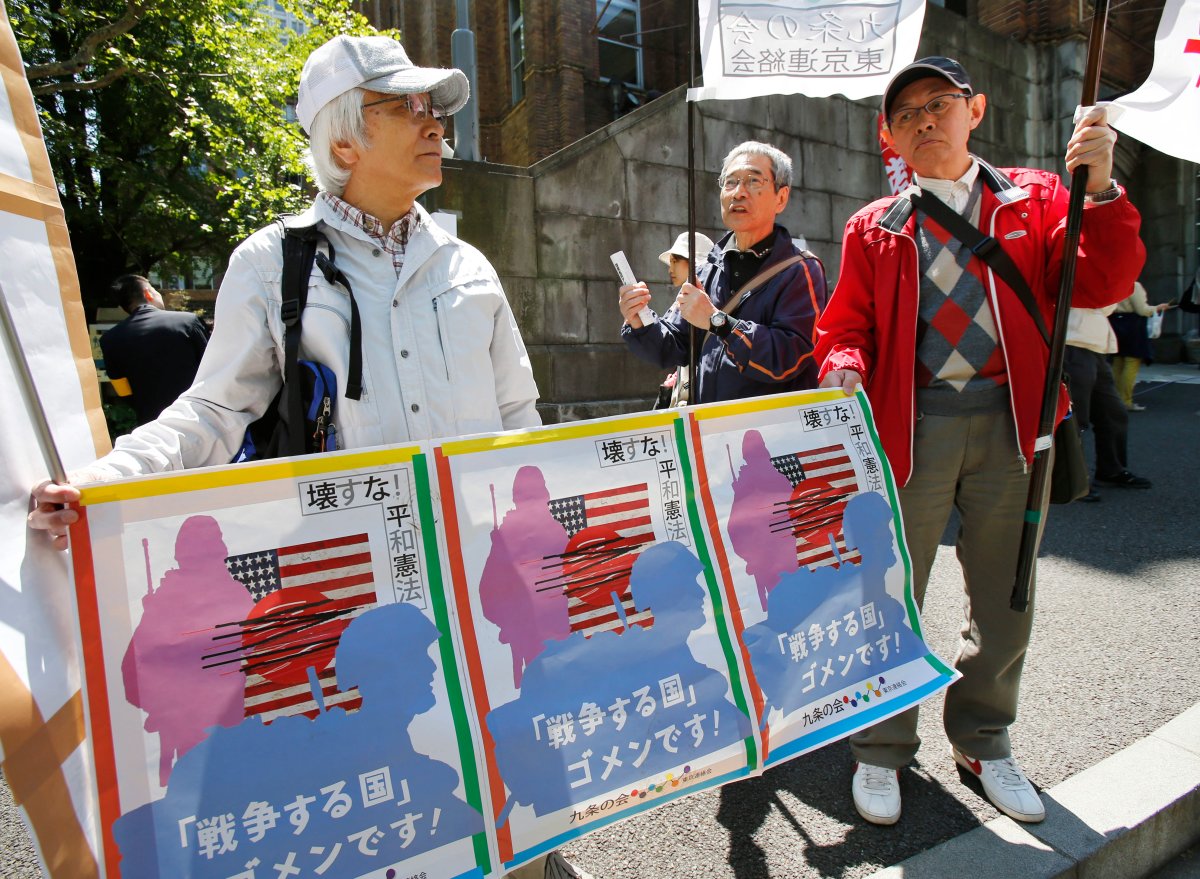TOKYO – Hundreds of Japanese, young and old, gathered in downtown Tokyo in a peaceful protest Friday against calls by Prime Minister Shinzo Abe to amend the country’s pacifist constitution and give the government more power to abridge civil liberties.

Opposition parties, labour groups, religious organizations and individuals turned out to march from a park near the Imperial Palace through the Ginza shopping district, beating drums and chanting their opposition to such moves by Abe and the ruling Liberal Democratic Party.
Japan was marking the 66th anniversary of its constitution on Friday, a national holiday.
Supporters of amending the constitution want to change the requirement that constitutional amendments win two-thirds approval in both houses of parliament before they are put to a national referendum. They want that changed to simple majority approvals in parliament before a referendum.
Opponents say such changes could allow the government to undermine civil liberties. Reinforcing such concerns is a proposal by the Liberal Democrats that calls for making civil liberties such as freedom of speech and expression subordinate to the public interest.
“The constitution is meant to protect the people and their rights from the government. What they want to do is to reverse that,” said Hiroshi Honna, a member of a group of World War II air raid victims’ families and of a group against amending Article 9 of the constitution, in which Japan renounces the use of war.

Get daily National news
His was among dozens of groups handing out flyers and marching in the “Ginza Parade.”
Surveys show mixed opinions among Japanese to revising the constitution, with some media organizations showing a majority in favour while others show the number of those who are undecided at nearly half, with the rest divided about evenly.
While many Japanese favour Abe’s calls for a greater sense of patriotism and national pride, many believe their nation’s rejection of war and its protection of civil liberties are essential for its prosperity.
The nuclear disaster following the March 2011 earthquake and tsunami in northeastern Japan has likewise left many Japanese wary of allowing the authorities wider powers.
The constitution was written by U.S. officials whose main concern was keeping Japan from rearming soon after World War II. Until recently, discussions of constitutional amendments mainly focused on longtime calls to change Article 9, which keeps a tight rein on Japan’s military, known as the “Self-Defence Forces.”
Abe took office late last year, vowing to end two decades of economic stagnation and restore Japan’s greatness. He has long campaigned for boosting the role of the military, and with his popularity ratings at more than 70 per cent appears confident of winning a strong mandate for the Liberal Democrats in a July election for the upper house of parliament.
Among other things, Abe wants Japan to be able to engage in “collective defence,” with its troops able to fight alongside Tokyo’s allies – especially the U.S. troops who are obliged to defend Japan – if either comes under direct attack. The United States has about 50,000 troops in Japan, including its largest air base in Asia.
Right now, if Japan’s current standoff with China over a group of disputed islands flared into actual conflict, and U.S. Navy ships coming to Japan’s assistance took enemy fire, Japan wouldn’t be able to help them.
The prospect of a stronger role for Japan’s military causes great unease in neighbouring South Korea and China, which endured invasion and occupation by Japanese Imperial forces before and during World War II.
Liberal Democrats and other supporters of constitutional reform contend Tokyo needs greater leeway to cope with China’s rising military power.
“China is getting stronger and stronger, and meanwhile our military is confined to a purely defensive posture,” Liberal Democratic lawmaker Gen Nakatani said in a Friday television discussion on NHK TV.
Addressing the rally Friday, Mizuho Fukushima, head of the opposition Green Party, urged listeners to lobby against amending the constitution.
“If they can amend the constitution through a simple majority the government will be able to make whatever changes it wants whenever it suits them,” she said.
Kazuo Shii of the Japan Communist Party said high requirements for amending the constitution were considered “common sense” in most countries.
“The constitution exists to protect your own rights,” he said. “There is a good reason it is not easy to amend it.”







Comments